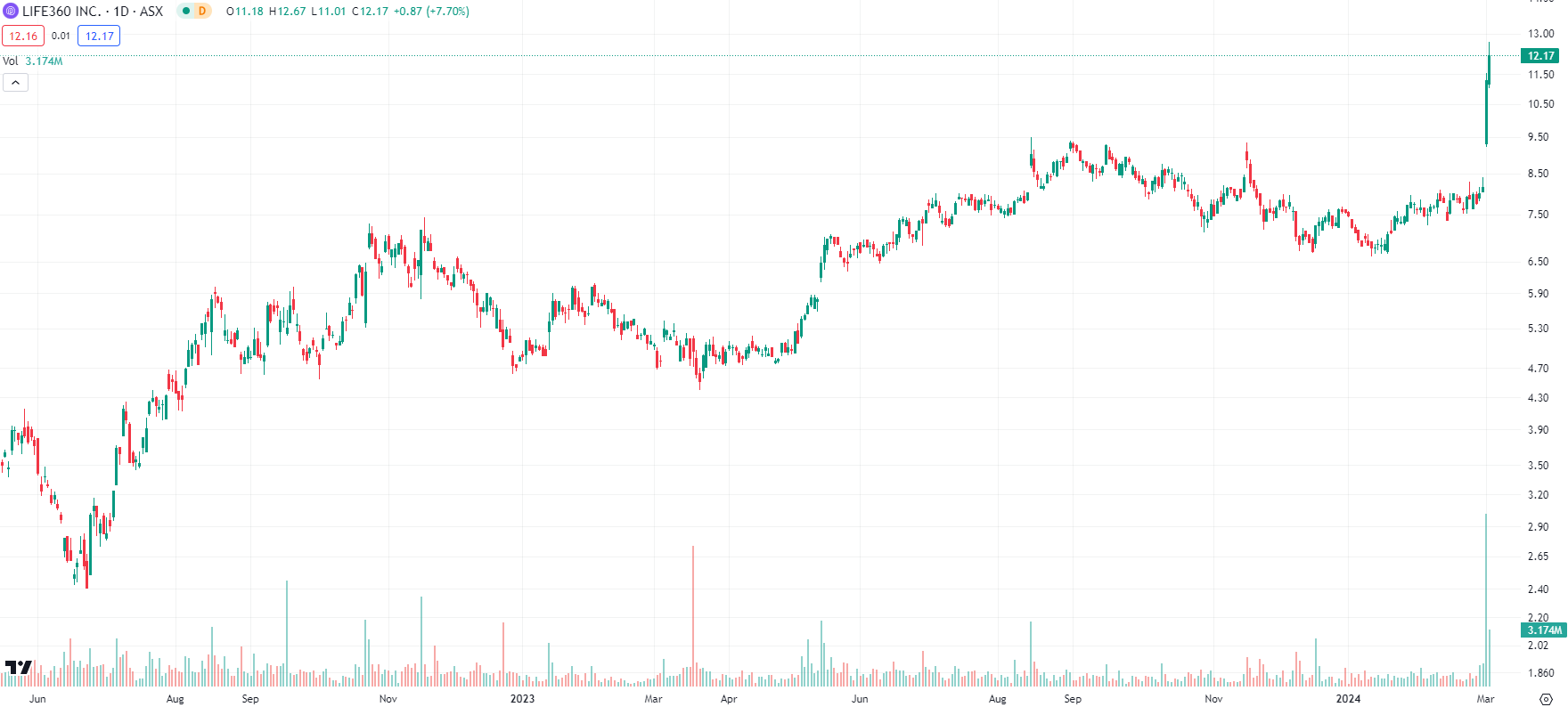Life360 (ASX:360): What other company lets you know where your loved ones are?
![]() Nick Sundich, March 8, 2024
Nick Sundich, March 8, 2024
Life360 (ASX:360) is this week’s stock of the week. It is both an international and domestic stock, because the Silicon Valley-headquartered firm has been listed on the ASX since March 2019. It isn’t yet profitable and probably should’ve been a while ago. But we think has made good progress towards this goal and is on the right track.
Introduction to Life360 (ASX:360)
Life360 listed on the ASX in 2019 because it was too small for the NASDAQ but thought it was the right time to list. It seems inevitable that it’ll happen at some point as it has tried to make it happen, but put pause on its plans in early 2022 as the Tech Wreck began. It is led by its founder Chris Hulls who still retains a 3.6% shareholding and its board includes Randi Zuckerberg (the sister of Mark Zukerberg).
Life360 operates an app that allows parents and children to stay connected. The app’s original premise was for parents to see the location where their children are, an idea that remains its primary capability.
Acquisitions to expand its scope
Several other features have been added to the platform since the company was founded in 2008. The app can also help children see where their parents are, help family members monitor their movements and even detect traffic collisions that users are involved in. The company’s 2021 acquisition of fellow Silicon Valley tech company Tile diversified the company into tracking things in addition to people. Tile sells small hardware devices that can be attached to items such as wallets and keys. If you’re thinking AirTags, you’ve got the right idea. In the same year, Life360 also acquired Jiobit, a Chicago-based manufacturer of wearable locational devices.
The Life360 app uses the GPS chip in your smart phone. It can not only alert parents, but anyone in a specific ‘Circle’, like other household members and/or close friends. It operates on a ‘freemium’ model, offering a Basic Service for free and two tiers (Gold and Platinum) with premium features.
These include free towing of vehicles involved in a collision, ID theft protection, reimbursement of funds stolen through cybercrimes, credit monitoring and travel support. The Gold tier costs US$14.99 per month, or US$99.99 per year, while the Platinum tier costs US$24.99 per month, or US$199.99 annually.
Good growth since listing
The pandemic struck less than a year after Life360 listed on the ASX, forcing customers to stay home, which reduced the need for the company’s app. But if you look at Life360’s growth since 2019, you’d be forgiven for thinking the pandemic never happened. It has benefited through the acquisitions it has made and organic growth in its core business.
Cast your mind back to its half-yearly results in 2019 (1HY19). It recorded US$24.6m in revenue, recorded 23.1m Monthly Active Users (12.7m of which were in the US) and held 696,000 Paying Circle members (in other words, premium subscribers).
Now let’s jump ahead to its FY23 results, released last week. It made US$305m in revenue, including $200m of subscription revenue, had 61.4m Monthly Active Users (24.6m of which were outside the US) and it has 1.8m Paying Circles Members. Its Annualised Monthly Revenue was $248.7m and Average Revenue per Paying Subscription was US$121.09 (up from $96.96 one year ago).
But not yet profitable
The trouble is that it is not yet profitable. The company made $20.6m in positive EBITDA and $7.5m in operating cash flow. It made a net loss of $28.2m, although this was a $63.5m improvement from the previous year.
The company has guided to:
- $365-375m in revenue
- $30-35m in ‘adjusted EBITDA
- a $80-90m year-end cash balance
Consensus estimates call for US$367.5m in revenue (up 21%), $32.3m in EBITDA (up 56%) and a 23c per share net loss or a loss of $15m (half of the year before). For FY25, $429.8m in revenue (up 17%), $58m in EBITDA (up 20%) and a narrow $1.3m loss. Then in FY26, the company is expected to be profitable with a small $6.7m profit. Revenue is expected to be $506.2m (up 18%) and EBITDA $77.5m (up 33%).
The mean target price among analysts covering the stock is $13.14, only 8% higher than the $12.17 it is trading at now.

Life360 (ASX:360) share price chart, log scale (Source: TradingView)
Our valuation
We think Life360 could be worth $14.35, which would be up 75%. This is using a DCF model assuming:
- Consensus estimates up until CY26
- Modest growth for 7 years thereafter with 10% revenue growth and gradually growing NPAT margins from 10-30% over that time frame
- A WACC of 13%, using a 1.5x beta, a 6% equity premium and 4% risk free rate of return, as well as assuming no debt.
- AUD/USD of 66c.
It is important to note that Life360 trades using CDIs rather than ordinary shares. So, we value it at US$1.9bn which translates to ~A$2.9bn and we assume just over 200m CDIs on issue.
The risks with this one are:
- Slowing in revenue growth
- Slower progress towards key profitability
- Stock market and macroeconomic conditions
- Competition risks
- Key personnel risk
But we think if the company can stay on track, it could make some good returns for shareholders in the months to come.
What are the Best ASX Stocks to invest in right now?
Check our buy/sell tips
Blog Categories
Get Our Top 5 ASX Stocks for FY25
Recent Posts
Your invitation to the Freelancer Investor Day
Your invitation to the Freelancer Investor Day Freelancer (ASX: FLN) is a Sydney-based company that has been the subject of…
Kamala Harris stocks: If Joe Biden’s VP wins the White House in 2024, which stocks will win?
With the US Presidential election now certain to be a Kamala Harris v Donald Trump showdown, we’ve looked at so-called…
South32 (ASX:S32): Is it the dark horse amongst ASX 200 miners or have cyclones and commodity prices hit it too hard?
South32 (ASX:S32) began life as a spinoff from BHP back in 2015, capitalised at $9bn. In mid-2024, it is capped…



